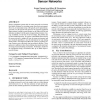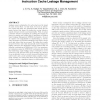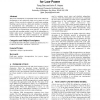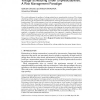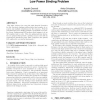106
Voted
ISLPED
2003
ACM
15 years 6 months ago
2003
ACM
Energy constrained systems such as sensor networks can increase their usable lifetimes by extracting energy from their environment. However, environmental energy will typically no...
102
click to vote
ISLPED
2003
ACM
15 years 6 months ago
2003
ACM
The increasing prominence of portable systems and the need to limit power consumption and hence, heat dissipation in very high density VLSI chips have led to rapid and innovative ...
68
Voted
ISLPED
2003
ACM
15 years 6 months ago
2003
ACM
Dual-supply voltage design using a clustered voltage scaling (CVS) scheme is an effective approach to reduce chip power. The optimal CVS design relies on a level converter (LC) im...
53
Voted
ISLPED
2003
ACM
15 years 6 months ago
2003
ACM
90
Voted
ISLPED
2003
ACM
15 years 6 months ago
2003
ACM
Power dissipation is unevenly distributed in modern microprocessors leading to localized hot spots with significantly greater die temperature than surrounding cooler regions. Exc...
97
Voted
ISLPED
2003
ACM
15 years 6 months ago
2003
ACM
The power consumption of a sequential circuit can be reduced by decomposing it into subcircuits which can be turned off when inactive. Power can also be reduced by careful state e...
65
Voted
ISLPED
2003
ACM
15 years 6 months ago
2003
ACM
ISLPED
2003
ACM
15 years 6 months ago
2003
ACM
This paper proposes two very fast graph theoretic heuristics for the low power binding problem given fixed number of resources and multiple architectures for the resources. First...
ISLPED
2003
ACM
15 years 6 months ago
2003
ACM
A significant fraction of the total power in highly synchronous systems is dissipated over clock networks. Hence, low-power clocking schemes would be promising approaches for futu...
111
click to vote
ISLPED
2003
ACM
15 years 6 months ago
2003
ACM
This paper addresses two aspects of low-power design for FPGA circuits. First, we present an RT-level power estimator for FPGAs with consideration of wire length. The power estima...
